

675 Free Movies Online: Great Classics, Indies, Noir, Westerns, etc. Watch 4,000+ movies free online.
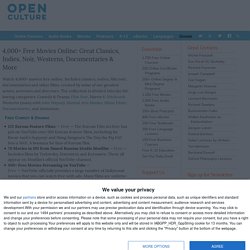
Includes classics, indies, film noir, documentaries and other films, created by some of our greatest actors, actresses and directors. The collection is divided into the following categories: Comedy & Drama; Film Noir, Horror & Hitchcock; Westerns (many with John Wayne); Martial Arts Movies; Silent Films; Documentaries, and Animation. Free Comedy & Dramas 125 Korean Feature Films – Free – The Korean Film Archive has put on YouTube over 100 Korean feature films, including Im Kwon-taek’s Sopyonje and Hong Sangsoo’s The Day the Pig Fell Into a Well. A bonanza for fans of Korean film.70 Movies in HD from Famed Russian Studio Mosfilm – Free – Includes films by Tarkovsky, Eisenstein and Kurosawa. Collective:unconscious – Free – Five indie filmmakers adapt each other’s dreams for the screen. Free Hitchcock, Noir, Horror & Thriller Films A Bucket of Blood – Free – Roger Corman’s classic comedy/horror film set in Bohemian San Francisco.
Flipped Classroom Article Doesn’t Get it Right. I initially found the recent USA Today article “Flipped Classrooms May Not Have an Impact on Learning” difficult to accept.
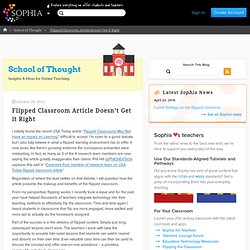
I’m open to a good debate, but I also fully believe in what a flipped learning environment has to offer. It now looks like there’s growing evidence the conclusions presented were misleading. In fact, as many as 3 of the 4 research team members are now saying the article greatly exaggerates their claims. Phil Hill (@PhilOnEdTech) captures this well in “Comment from member of research team on USA Today flipped classroom article.” Regardless of where the dust settles on that debate, I still question how the article presents the makeup and benefits of the flipped classroom. From my perspective, flipping works. Part of the success is in the delivery of flipped content. The article also only focused on college level courses. How to Use Digital Storytelling in Your Classroom.
This how-to article accompanies the feature "Film School: Making Movies From Storyboard to Screen.
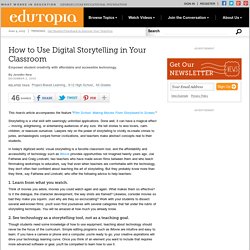
" Storytelling is a vital skill with seemingly unlimited applications. Done well, it can have a magical effect -- moving, enlightening, or entertaining audiences of any size. We tell stories to woo lovers, calm children, or reassure ourselves. Lawyers rely on the power of storytelling to vividly re-create crimes to juries, archaeologists conjure former civilizations, and teachers make abstract concepts real to their students.
In today's digitized world, visual storytelling is a favorite classroom tool, and the affordability and accessibility of technology such as iMovie provides opportunities not imagined twenty years ago. 1. Think of movies you adore, movies you could watch again and again. Verriss der Hattie-Studie. Vorwurf der 'subjektiven Spekulation' Bildquelle: flickr-User OnTask [CC by-sa] Alle reden über die Mega-Studie von John Hattie, nach der die Lehrer/in allein den Lernerfolg bestimmt - und nicht etwa Bildungssystem, Klassengröße usw.
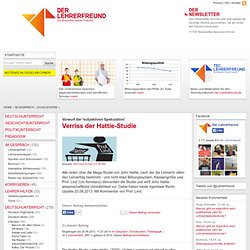
Prof. Lind (Uni Konstanz) demontiert die Studie und wirft John Hattie wissenschaftliche Unredlichkeit vor. Dabei haben beide irgendwie Recht. Die Hattie-Studie (John Hattie (2009): Visible Learning) ist aktuell in aller Munde. Stark verkürzt lässt sich die revolutionäre Erkenntnis so umschreiben: Das Einzige, was den Lernerfolg bedingt, ist die Lehrer/in, wenn sie alles richtig macht. Die Hattie-Studie ist ein Mega-Werk, die Berichterstattung in den Medien beschränkt sich fast durchgängig auf die Wiedergabe und Kommentierung der Ergebnisse.
GBW 04.02.2013: Meta-Analysen als Wegweiser? Wissen. Wissen wird in der Erkenntnistheorie traditionell als wahre und gerechtfertigte Meinung (englisch justified true belief) bestimmt.
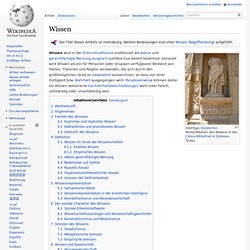
Generell wird Wissen als ein für Personen oder Gruppen verfügbarer Bestand von Fakten, Theorien und Regeln verstanden, die sich durch den größtmöglichen Grad an Gewissheit auszeichnen, so dass von ihrer Gültigkeit bzw. Wahrheit ausgegangen wird. Paradoxerweise können daher als Wissen deklarierte Sachverhaltsbeschreibungen wahr oder falsch, vollständig oder unvollständig sein. Wortherkunft[Bearbeiten] Der Ausdruck ‚Wissen‘ stammt von althochdeutsch wizzan bzw. der indogermanischen Perfektform *woida ,ich habe gesehen‘, somit auch ,ich weiß‘ [1]; von der indogermanischen Wurzel *weid- leiten sich auch lateinisch videre ,sehen‘ und Sanskrit veda ,Wissen‘ ab.
Allgemeines[Bearbeiten] Wissen steht als grundlegender erkenntnistheoretischer Begriff im Zentrum zahlreicher philosophischer Debatten. Ein wichtiges Thema der Philosophie des 20. Definition[Bearbeiten]